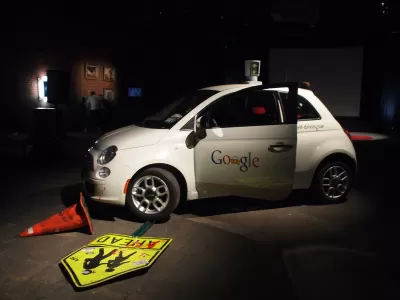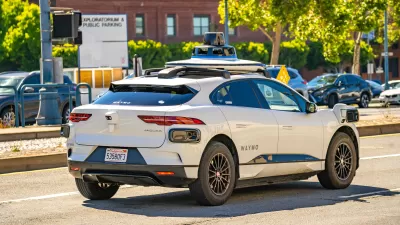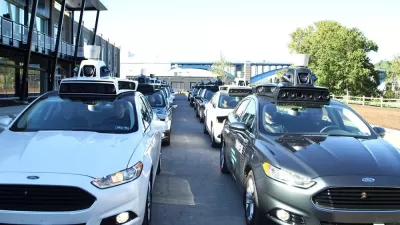No one in the business doubts that autonomous vehicles will have some role to play in the future of transit. But right now, questions abound and answers are still only speculative.

"The autonomous vehicle, some predict, will replace many of today's forms of transportation and radically expand mobility by allowing people, including the young, old, and disabled, to get around without having to walk, without having to know how to drive, and without having to wait for a bus or train."
Systems where autonomous cars are shared "could have significant benefits for cities by reducing the need for parking, encouraging intermodal trips, and expanding mobility by providing lower-cost travel options."
Despite an array of potential benefits, there are also, inevitably, potential problems. In this article, Yonah Freemark reports on conversations with leading figures in the alternative transport industry, including Zipcar co-founder Robin Chase.
Regulation and control is one outstanding issue. Freemark writes, "novel approaches to transportation have relied on tactics that avoid many of the regulations that have been in place for decades, or require them to be altered [...] Is the public sector abandoning its role in favor of crowdsourcing and crowd ratings?"
Freemark investigates related questions, including:
- Will individual ownership of self-driving vehicles exacerbate traffic and harm the environment?
- Can automated taxi services charge rates low enough to compete with buses and trains?
- Are cities ready to subsidize self-driving car ownership among low-income residents?
- Is eliminating the vast majority of transportation jobs worth it?
FULL STORY: Will autonomous cars change the role and value of public transportation?

Study: Maui’s Plan to Convert Vacation Rentals to Long-Term Housing Could Cause Nearly $1 Billion Economic Loss
The plan would reduce visitor accommodation by 25,% resulting in 1,900 jobs lost.

North Texas Transit Leaders Tout Benefits of TOD for Growing Region
At a summit focused on transit-oriented development, policymakers discussed how North Texas’ expanded light rail system can serve as a tool for economic growth.

Why Should We Subsidize Public Transportation?
Many public transit agencies face financial stress due to rising costs, declining fare revenue, and declining subsidies. Transit advocates must provide a strong business case for increasing public transit funding.

How Community Science Connects People, Parks, and Biodiversity
Community science engages people of all backgrounds in documenting local biodiversity, strengthening connections to nature, and contributing to global efforts like the City Nature Challenge to build a more inclusive and resilient future.

Alabama: Trump Terminates Settlements for Black Communities Harmed By Raw Sewage
Trump deemed the landmark civil rights agreement “illegal DEI and environmental justice policy.”

Dear Tesla Driver: “It’s not You, It’s Him.”
Amidst a booming bumper sticker industry, one writer offers solace to those asking, “Does this car make me look fascist?”
Urban Design for Planners 1: Software Tools
This six-course series explores essential urban design concepts using open source software and equips planners with the tools they need to participate fully in the urban design process.
Planning for Universal Design
Learn the tools for implementing Universal Design in planning regulations.
City of Santa Clarita
Ascent Environmental
Institute for Housing and Urban Development Studies (IHS)
City of Grandview
Harvard GSD Executive Education
Toledo-Lucas County Plan Commissions
Salt Lake City
NYU Wagner Graduate School of Public Service




























